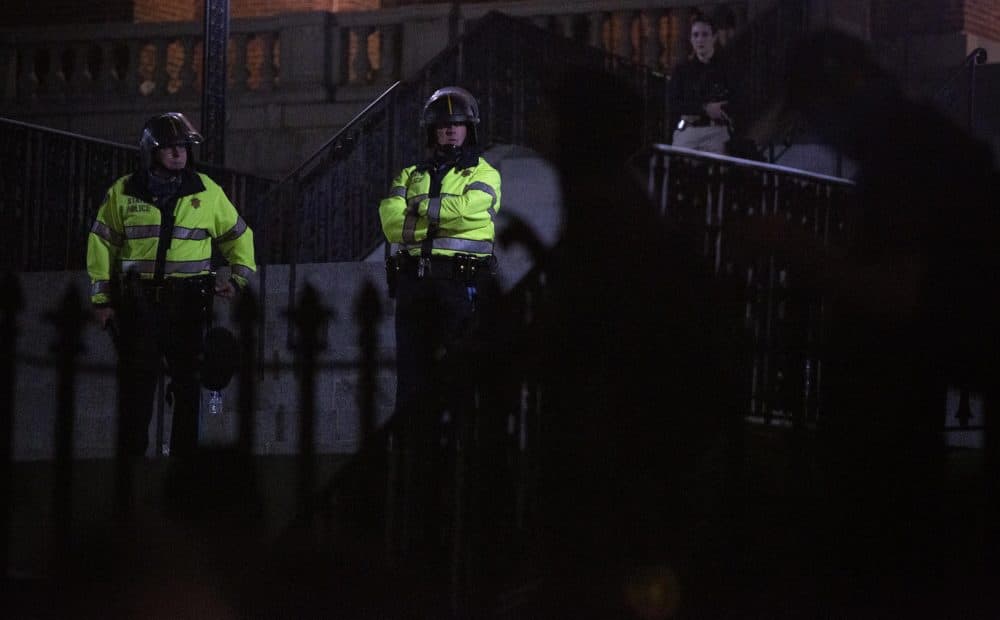Advertisement
Understanding 'Qualified Immunity' And Its Place In The Police Reform Debate
Resume
One area of significant contention in the state senate's recently passed police reform bill was whether to limit "qualified immunity," a legal doctrine that protects police and other public employees from lawsuits.
Qualified immunity has been both a lightning rod in local and national police reform debates, and a source of confusion about what it actually entails.
We turn to Nancy Gertner, a retired federal judge, WBUR legal analyst and senior lecturer at Harvard Law School, on what qualified immunity is and why many law enforcement officials are trying to hold on to it.
On how the "qualified immunity" doctrine came about:
"The doctrine is a judge-made doctrine that came about in pretty much the late 1970s and early 1980s. And it was literally a concern that constitutional criminal law, in other words, the ways in which the Constitution limited or affected police behavior — that it was unfair because of new developments in constitutional law, to have a police officer bound by those new developments. Famously, one judge said ... a cop on the beat shouldn't have to be reading the advance sheets (the ways in which people get notice of opinions). And it was really phrased in terms of a police officer could not anticipate legal developments. It was focused in on the big and new constitutional changes that were going on after the Warren Court and said, 'How could a police officer know about those kinds of changes?' But over time, it has evolved into something really quite a bit different. It's not just saying a police officer couldn't have known what the Supreme Court decided yesterday about the Fourth Amendment, but it has come to be that the police officer, for him to be held liable, there had to have been an existing precedent on the specific fact in question."
"Let me give you an example: There was a case of a SWAT team that fired tear gas grenades into a house carrying someone they wanted to arrest. That person wasn't there. That caused considerable damage. The Court of Appeals said, 'Well, there's no qualified immunity because there was no precedent involving tear gas and houses.' Now, there was precedent about the scope of searches, etc., but there was no specific precedent that dealt with ... tear gas going into a house, or a case of ... a police officer [who] shot a dog trying to apprehend someone in a backyard, and wound up shooting a young girl. And the court literally said that the child's right not to be accidentally shot in the leg is not clearly established. So [what] I'm saying is, over time this became not 'How could a police officer have known, you know, the latest constitutional issue,' but ... a police officer gets excused if there was not an existing precedent involving the facts that are in his case. Well, there never is an existing precedent involving those specific facts."
On why it's front and center in the current police reform debate:
"Well, what happens is that the 'immunity' entitles a judge to dismiss the case without it ever getting to a jury. While a jury ... might get the issue of what comprises excessive force or what comprises an unfair search, qualified immunity entitles a police officer who's being sued to move to dismiss, and the case is then gone. And it's gone in a way that is particularly troubling. The judge is supposed to decide, or at one point was supposed to decide, was the plaintiff's rights violated? And then the second question is, was the law clearly established? Over time, and because of the Supreme Court, judges no longer ... answer the first question: whether someone's rights were violated. So that meant the law is not ever going to be established even going forward, because case after case was saying, essentially, 'I don't know whether [the police officer] did anything wrong, but it wasn't clearly established.' "
On how qualified immunity plays out in lawsuits against law enforcement today:
"The notion that a police officer who does something that comprises a crime will be punished and go to jail is true, although we recognize that that doesn't happen very often, as we saw in the George Floyd case [with criminal charges]. But we're not talking about criminal prosecution here, because that, to some degree, is the most extreme example of wrongful conduct. We're talking about a civil suit, if someone violated your constitutional rights. It may not comprise a crime, but it was essentially violating your constitutional rights. ... [The police officer] did something wrong, he went outside the boundaries of what the Constitution allows. To say that people can sue, yeah, you can sue and it will be dismissed if it doesn't fit [these], in my view, absurd requirements. So it'll be dismissed. ... This is like constitutional malpractice. It's as if saying the only way you can deal with a doctor that left his instruments in your body after the surgery is if it's a crime. Well, we're not talking crime. We're talking about civil damages for violation of a constitutional right. So the fact that people can be sent to jail doesn't control conduct. What controls conduct is lawsuits."
On the argument that eliminating qualified immunity will put undue financial and civil risk on law enforcement, curb their behaviors, and make them overly cautious:
"It is a false argument. Ninety-nine point eight percent of cases that are brought — I've looked this up — of constitutional claims against police officers are paid for by the government or even sometimes the union. In other words, the municipality or the state will pay whatever damages are assigned to the police officer. So there is really no financial penalty at all. And what you're talking about is having a range of conduct that may well be wrong, that is broader than the range of conduct that we allow now, and allowing those cases to go to go to trial before a jury. So it's really not an impediment to the police at all, any more than malpractice since actions against doctors keep doctors from doing surgery. Good doctors do not have a problem [with that]."
On if the end of qualified immunity could affect police officers decisions:
"That's really the usual kind of scare tactics that the police use whenever there are efforts to curb their power. The fact that those who are engaged in malpractice — like a doctor or a lawyer — can be sued for it and wind up with damages against them, doesn't stop people to being doctors or lawyers. It makes them exercise more care. And that's exactly what we're trying to do. So that's just simply absurd. If they think twice before they violate someone's constitutional rights, rather than, as Justice Sotomayor just said in a case where she dissented, she says, with qualified immunity ... it's the wrong signal: shoot first and think later, and count on being exonerated."
This article was originally published on July 14, 2020.
This segment aired on July 14, 2020.


